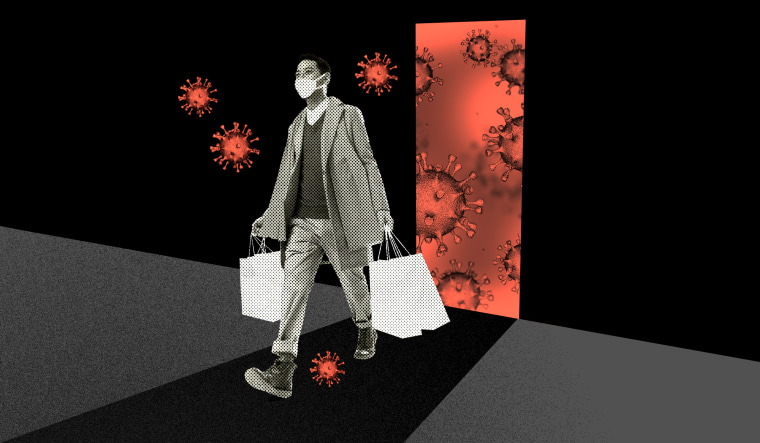Black Friday may have come and gone, but for many there's still plenty of holiday shopping to do — whether you're buying gifts for friends, family or co-workers, shopping for presents is a holiday tradition of its own.
This year, that tradition is just one of many complicated by the coronavirus epidemic. While case counts and hospitalizations rise around the country, medical experts are urging people to stay home and shop online as much as possible, but if you absolutely must shop in stores, be sure to follow general guidelines and best practices to avoid the spread of the virus.
"The most important thing for people to think about, if they're going to go out and shop, is 'What's my individual risk?'" said Dr. Lucian Davis, an associate professor of epidemiology at the Yale School of Public Health in New Haven, Connecticut. "Of course you're going to try to keep a distance and wear a mask and minimize the amount of time that you're out there, but I wouldn't want to take that risk if I was at high risk."
The Centers for Disease Control and Prevention urge people to ask themselves a few key questions to evaluate the risk of going out:
- Is COVID-19 spreading in your area?
- Could you come into close contact with someone who is sick or someone who is not wearing a mask?
- Are you at increased risk of severe illness from COVID-19?
- Do you take everyday actions to protect yourself from COVID-19?
Davis said that no matter what risk level someone is at, they should try to maintain a 6-foot distance from other shoppers, wear a mask or cloth face covering over their nose and mouth at all times while indoors, follow any arrows or instructions that might guide customers through aisles, and be sure to keep distance between themselves and the employees at the store. Maintaining these "really important" precautions can limit the spread of the coronavirus.
However, in general, shopping in a store for a short period of time is not a risky activity.
"The models that are out there that have looked at ... places like retail outlets, don't suggest that those areas are high-risk areas to go to," Davis said. "They're probably similar in risk to going to the grocery store."
In March, Celine Beitchman, director of nutrition at the Institute of Culinary Education explained to TODAY that grocery shopping was also a safe bet. Even during the most severe lockdowns, grocery stores remained open and operating.
"In general, places that sell food are hard-wired for sanitation and hygiene," Beitchman told TODAY Food. There is potential for food shortages around the holidays. Retailers have promised shoppers that the supply chain for necessities like meat, pasta and more have been shored up, but there is some concern that lots of people trying to buy the same few items might cause some difficulties.
"We're working directly with our manufacturers to ensure that we do have adequate supply," said Chelsea Minor, the corporate director of public affairs for Raley's, a West Coast-based grocery chain, in early November. "There is plenty of food to go around, you may not have the exact products that you're looking for, but there will be options, so be flexible."
No matter what shopping you're doing, see if you can do it online, or order in advance to pick up at the store. These options will limit your time spent in the store.
If you do order packages online, there's little concern about the virus being transmitted through packaging or other materials, said Davis.
"I don't think we're seeing a lot of stories of people getting infected that way," he explained. "The data suggests that the virus doesn't live that long on surfaces ... Myself and my family, we don't really worry about it too much. We just make sure that we dispose of the box and wash our hands appropriately. I think people should do what they're comfortable with, but I don't think that's a high-risk activity at all compared to (shopping in-store)."

